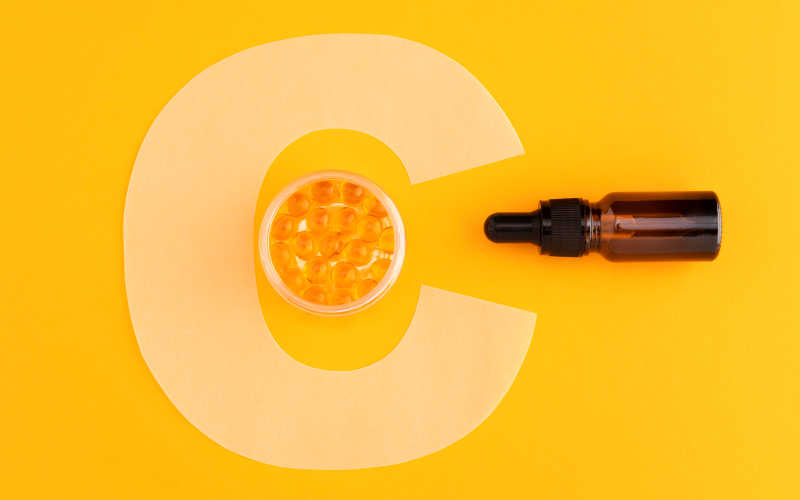Ever wonder why oranges are practically synonymous with keeping the doctor away? It’s all thanks to a mighty micronutrient called vitamin C!
What is Vitamin C?
Our bodies rely on the vitamin, also called ascorbic acid, to build and grow properly.
Think of it as a construction crew chief, making sure blood vessels, bones, muscles, and even cartilage get built strong. But vitamin is more than just a builder! It’s also a superhero, shielding our cells from villainous free radicals that can cause damage.
Foods Rich in Vitamin C
Look no further than your produce aisle! Fruits and veggies like guava, kiwi, oranges, and berries are overflowing with this superhero nutrient. Don’t forget the colorful crew of bell peppers, broccoli, kale, and Brussels sprouts – they’re all vitamin champions too.
By mixing and matching these delicious options, you can easily meet your daily vitamin needs and keep your body running at its best.
Layering Vitamin C in Your Skincare Routine
Vitamin is a popular ingredient in skincare products due to its antioxidant properties and its role in collagen production. When layering skincare products, the rule of thumb is to apply from thin to thick consistencies. Vitamin C serums are typically applied after cleansing and toning but before moisturizing. Layering the vitamin with other antioxidants like vitamin E and ferulic acid can enhance its effectiveness.
When to Use Vitamin C
The vitamin can be used at any time of the day. However, if you’re incorporating it into your skincare routine, it’s often recommended to apply it in the morning after cleansing and before applying sunscreen. As a dietary supplement, the timing can depend on individual preferences and tolerability.
How to Apply Vitamin C
When using a vitamin serum, apply it after cleansing and toning your skin. Allow the serum to absorb into your skin before applying your moisturizer. If you’re using a vitamin powder, you can mix it with a water-based product like a serum or lotion and apply it to your skin.
Can You Take Too Much Vitamin C?
While vitamin is generally safe, consuming high doses can lead to digestive distress, such as diarrhea and nausea. The upper limit for vitamin supplements is 2,000 mg per day. It’s important to remember that you can meet your daily vitamin needs through a balanced diet rich in fruits and vegetables.
Good Sources of Vitamin C
Citrus fruits like oranges and grapefruits are well-known sources of vitamin. Other excellent sources include red and green peppers, kiwi, strawberries, cantaloupe, and cruciferous vegetables like broccoli and Brussels sprouts.
Different Forms of Vitamin C
Vitamin comes in several forms, each with its own set of benefits. The most common form is L-ascorbic acid, which is the most researched and effective form. Other forms include sodium ascorbate, calcium ascorbate, sodium ascorbyl phosphate, ascorbyl glucoside, and liposomal vitamin C.
Conclusion
In conclusion, vitamin C is a vital nutrient with numerous health benefits. Whether you’re incorporating it into your diet or your skincare routine, understanding its functions, sources, and proper usage can help you make the most of this essential vitamin. Remember, it’s always best to consult with a healthcare provider before starting any new supplement regimen. Stay healthy and keep glowing!
FAQs
What exactly is vitamin C, and why is it important for health?
Vitamin C, also known as ascorbic acid, is a water-soluble vitamin that acts as a powerful antioxidant in the body. It plays a crucial role in various physiological processes, including collagen synthesis, immune function, wound healing, and the scavenging of free radicals. Adequate intake of vitamin is essential for maintaining overall health and vitality.
What are some common dietary sources of vitamin C?
Vitamin is naturally abundant in many fruits and vegetables, with citrus fruits like oranges, lemons, and grapefruits being particularly rich sources. Other excellent sources include berries such as strawberries, kiwis, and raspberries, as well as vegetables like bell peppers, broccoli, and spinach. Incorporating a variety of these foods into your diet can help ensure sufficient vitamin intake.
Can vitamin C help boost the immune system?
Yes, The vitamin plays a vital role in supporting immune function. It helps stimulate the production and activity of white blood cells, which are essential for fighting off infections and viruses. Regular intake of vitamin may help reduce the duration and severity of colds and flu-like illnesses, especially during periods of increased stress or exposure to pathogens.
Is it possible to consume too much vitamin C?
While vitamin is generally considered safe and well-tolerated, excessive intake can lead to gastrointestinal discomfort, including diarrhea and abdominal cramps. The recommended dietary allowance (RDA) for vitamin varies depending on age, gender, and other factors, but in most cases, consuming more than 2000 mg per day may increase the risk of adverse effects.
How can I incorporate vitamin C into my skincare routine?
Vitamin is a popular ingredient in skincare products due to its antioxidant properties and ability to brighten and firm the skin. To incorporate vitamin into your skincare routine, look for serums or creams containing ascorbic acid, the most bioavailable form of vitamin. Apply a few drops of serum to clean, dry skin in the morning before sunscreen for optimal absorption and protection against environmental damage.







